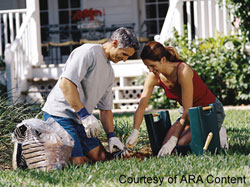 Study Shows 83 Percent of Homeowners Work in Their Yards (ARA) - Americans have a love affair with their lawns and gardens that will continue to heat up this summer, according to a new national study.
The "Why Americans DIY" Study of 1,000 American homeowners commissioned by Ace Hardware reveals that an overwhelming majority of American homeowners are active, do-it-yourself (DIY) landscapers. More than eight in 10 people polled -- 83 percent -- said they personally work in their yard or garden, reflecting the passion people have for these outdoor extensions of their homes.
Benefits cited by these "green thumbers" range from simply relaxing in the great outdoors and personally harvesting fruits and vegetables to making their homes more attractive. And this trend shows no sign of slowing down. According to the study, gardens will continue to be a strong focus of outdoor projects for DIYers throughout 2005. Nearly half of the respondents to the study -- 45 percent -- said they will add flowers; almost one-third will plant trees or shrubs; and 32 percent will grow vegetables.
"Yards and gardens offer a wonderful retreat from today's frenetic, fast-paced world," says Lou Manfredini, Ace Hardware's "Helpful Hardware Man" and national home improvement expert. "Plus, people greatly appreciate the simple pleasure of working with their hands to grow living things."
To keep the lawn and garden looking lush and lovely all summer long, Manfredini and Ace Hardware offer this advice:
Water Wisely
"Hot weather can be particularly brutal on grass and plants," says Manfredini, "and although year-round care is important, summer is the time to really 'baby' your greenery with regular, measured watering." Lawns require one to two inches of water per week, unless there's heavy rain. Over watering can actually deplete the soil of nutrients and make it more susceptible to disease. One rule of thumb: Water the lawn when the soil begins to dry out, but before the grass wilts. An inexpensive moisture meter, available at a hardware store, can be used to indicate the need.
"As a general rule, most plants prefer water at their 'feet,' not on their 'heads,'" says Manfredini. "So, water at soil level, not by overhead spraying an entire bed; and, water during the early morning or late evening hours to minimize evaporation."
Mulch Masterfully
Covering soil beds with the proper mulch will retain moisture that will benefit plants and maintain optimum soil conditioning. For example, three to six inches of straw has proved effective as mulch. Another option is to mow your lawn with a mulching blade that will shred the clipped grass blades and spread them evenly back over the lawn. Clippings deliver beneficial nitrogen into the soil, cutting down on the need to fertilize.
Manfredini recommends turning over mulch beds by raking in mid-summer to keep mulch fresh and the area looking like new. As fall approaches, mulch may begin to decompose, so rake thoroughly once more to help reduce the alternate freezing and thawing of the soil.
Mow Methodically
"Mowing correctly will keep your lawn in good health," says Manfredini. "There are three things to remember: mow with a sharp blade, trim regularly, and trim to the correct height." A dull mower blade makes ragged cuts on grass blades, opening up turf to disease. A clean cut prevents the grass from losing too much water.
Take care to determine the type of grass you have and its optimal mowing height, then mow often enough to maintain that height. To help the lawn cope with a dry spell, mow less frequently and at a higher cut.
Prune Properly
Pruning will renew or increase production of foliage, but each plant has specific needs, according to Manfredini. "For example, while hedging shrubs can be pruned year-round, flowering shrubs are best pruned only after they flower," he says. "Evergreen trees benefit most when pruned in early summer while fruit-bearing trees, shrubs and vines respond best in late winter. I recommend homeowners consult a local extension service or garden center manager at their hardware store to know what's best for their plants, trees and shrubs."
Garden Generously
The prettiest gardens are in bloom every week of the season. Vary flower types and planting times to allow for constant bloom.
For more information on gardening and other home improvement projects, log on to www.acehardware.com and click on the Answers@Ace icon. Web surfers also can submit home improvement questions directly to Manfredini by visiting the "Ask The Expert Corner" on acehardware.com. Whenever possible, Manfredini will respond with personalized advice within 48 hours.
Courtesy of ARA Content
|